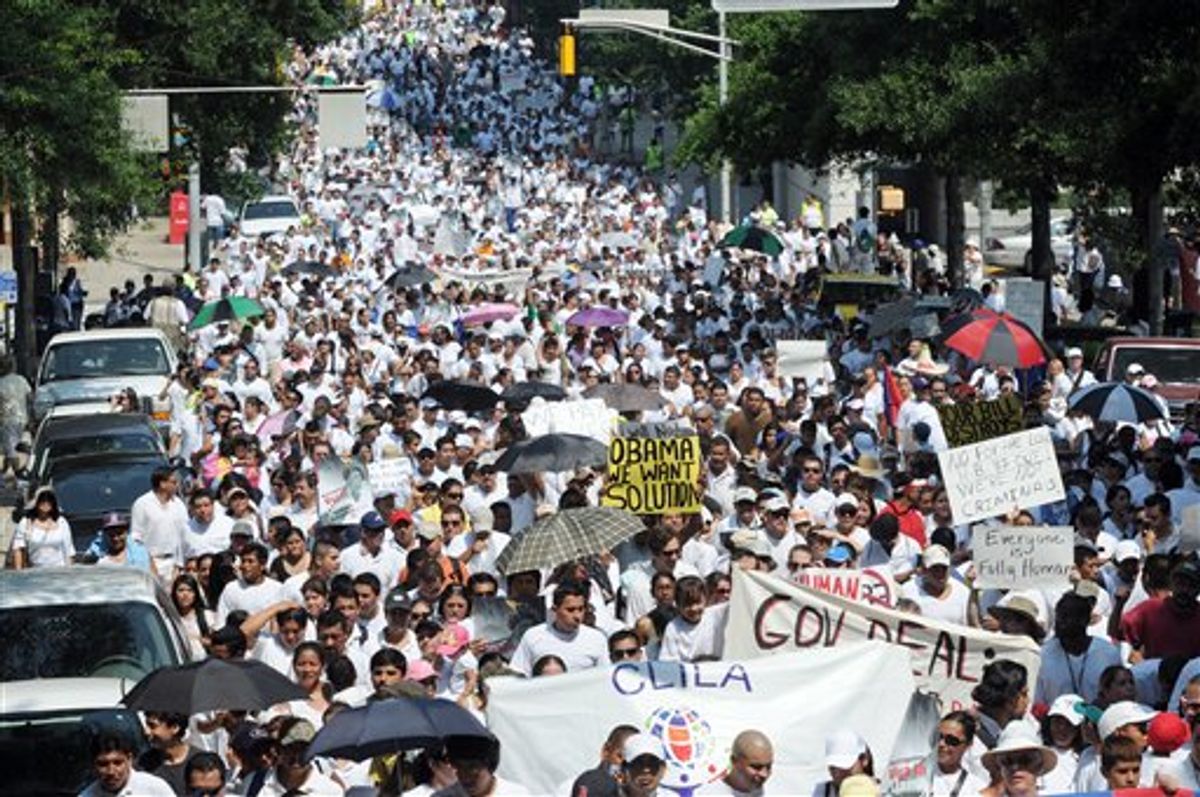Thousands of marchers stormed the Georgia Capitol on Saturday to protest the state's new immigration law, which they say creates an unwelcome environment for people of color and those in search of a better life.
Men, women and children of all ages converged on downtown Atlanta for the march and rally, cheering speakers while shading themselves with umbrellas and posters. Capitol police and organizers estimated the crowd at between 8,000 and 14,000. They filled the blocks around the Capitol, holding signs decrying House Bill 87 and reading "Immigration Reform Now!"
Friends Jessica Bamaca and Melany Cordero held a poster that read: "How would you feel if your family got broken apart?"
Bamaca was born in the U.S., but her mother and sister are from Guatemala. She said she fears they will be deported.
"I would be here by myself," said Bamaca, 13. "I have a feeling (the governor) doesn't know the pain affecting families. If he were to be in our position, how would he react?"
Adelina Nicholls, executive director of the Georgia Latino Alliance for Human Rights, said the crowd was sending a message.
"They are ready to fight," Nicholls said. "We need immigration reform, and no HB87 is going to stop us. We have earned the right to be here."
Azadeh Shahshahani of the American Civil Liberties Union of Georgia called the rally inspiring and said she hoped lawmakers would recognize the law's potential to damage the state.
"I think it's going to have an impact," she said. "Unfortunately, the damage has already been done as far as people of color having second thoughts about moving to Georgia."
Several different groups stood with the largely Latino crowd, including representatives from the civil rights movement. The Rev. Timothy McDonald, an activist who has been supportive of immigration protesters, was among the speakers showing his solidarity.
"You are my brothers and my sisters," McDonald told the crowd. "Some years ago, they told people like me we couldn't vote. We did what you are doing today. We are going to send a message to the powers that be ... that when the people get united, there is no government that can stop them. Don't let them turn you around."
MiLi Lai, a student at Emory who is Chinese, also attended the rally because the immigration law doesn't just apply to Latinos, but "all non-American people."
"We are the same community," Lai said. "We have to fight for our rights."
Bellanira Avoytes came to the rally with her husband and three children. Although she is a legal resident and her children were born in Georgia, she does not see herself as separate from undocumented Latinos.
"I have family who are not residents," she said. "I am together with the Latin people. I love Georgia. I have stayed here for 18 years. I want to buy a house here."
Saturday's rally follows a "day without immigrants" organized Friday, when some parts of the law took effect. It was organized by the Georgia Latino Alliance for Human Rights. The organization asked businesses to close and community members not to work or shop to protest the law.
On Monday, a judge temporarily blocked key parts of the law until a legal challenge is resolved. One provision that was blocked authorizes police to check the immigration status of suspects without proper identification. It also authorizes them to detain illegal immigrants. Another penalizes people who knowingly and willingly transport or harbor illegal immigrants while committing another crime.
Parts of similar measures in Arizona, Utah and Indiana also have been blocked by the courts.
Provisions that took effect Friday include one that makes it a felony to use false information or documentation when applying for a job. Another provision creates an immigration review board to investigate complaints about government officials not complying with state laws related to illegal immigration.



Shares